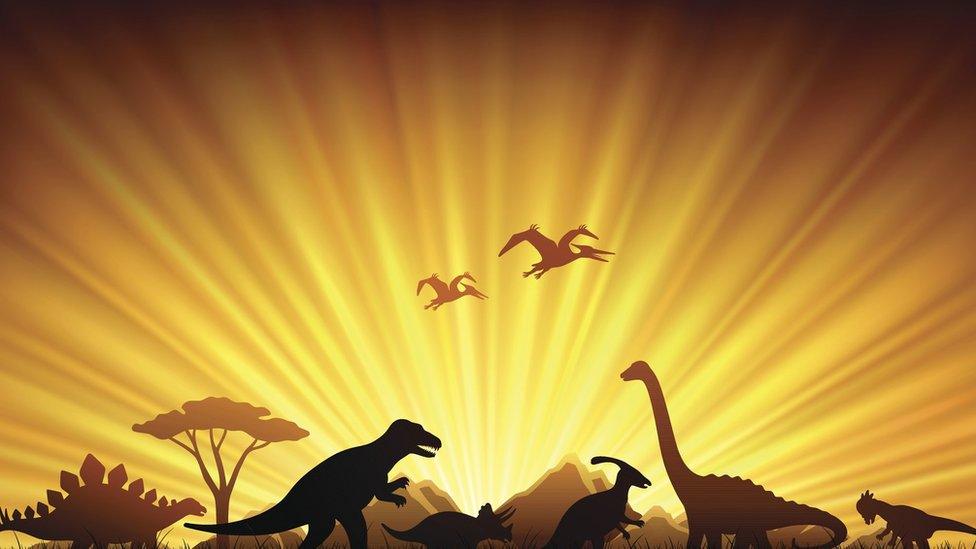Would dinosaurs still be here if an asteroid hadn't hit Earth?
- Published
- comments

According to new research, dinosaurs would have lived on Earth for many more years, if a huge asteroid hadn't smashed into the planet and wiped them out.
At the time of the asteroid impact, 66 million years ago, dinosaurs were the dominant land animals living across the globe. A study from the University of Bath and the Natural History Museum says that they could have continued to dominate had that impact not happened.
Earlier research by scientists had said that the numbers of dinosaurs were in decline anyway and some theories suggested that volcanic eruptions had meant conditions were becoming difficult for dinosaur life to continue.
However, Joe Bonsor, a PhD student at the Natural History Museum, says that the new research shows that the dinosaurs could have been doing fine, with some doing really well.
"What we found is that the dinosaurs were still dominant, they were still widespread and still doing really well," explains Joe. "If the asteroid impact had never happened then they might not have died out and they would have continued."
The Big Question: What's the difference between all the dinosaur periods?
The scientists discovered that some dinosaur groups, such as duck-billed hadrosaurs and the horned ceratopsians, were "thriving" and were widespread.
They were also the food for large predators such as the tyrannosaurs, meaning these carnivores would have had plenty to eat.
"Previous studies done by others have used various methods to draw the conclusion that dinosaurs would have died out anyway, as they were in decline towards the end of the Cretaceous period," Bonsor said, explaining that scientists had previously made this conclusion by looking at fossil records to see which species were around at the time.
But only a small fraction of what was alive at any one time gets turned into a fossil, so for this study, the scientists looked at dinosaur groups more broadly.
"We show that if you expand the data set to include more recent dinosaur family trees and a broader set of dinosaur types, the results don't actually all point to this conclusion, in fact only about half of them do," he said.
Scientists have suggested that dinosaur groups, such as the duck-billed hadrosaurs and the horned ceratopsians, were "thriving" before the asteroid hit
Scientists known as palaeontologists analyse fossils of dinosaur bones preserved in rock, but with gaps in the records, there's still no definite proof either way that dinosaurs would have continued to live successfully or unsuccessfully.
"Lack of data can often show a decline in species, but this may not be a reflection of the reality at the time," said Joe.
"The main point of what we are saying is that we don't really have enough data to know either way what would have happened to the dinosaurs.
"Instead we've shown that there is no strong evidence for them dying out. In fact some groups were thriving and there's no evidence to suggest they would have died out around that time had the extinction event not happened."
Even if dinosaurs hadn't died out it's unlikely we would have shared the planet
Either way it's unlikely that you'd be sharing the school bus with a velociraptor today.
Even though birds and creatures such as crocodiles are a reminder of their ancient ancestors, the asteroid impact set in motion massive changes on the planet followed by hundreds of centuries of evolution on Earth.
All of those sets of circumstances eventually resulted in human life like you, reading this article 66 million years later.
- Published30 June 2020
- Published8 July 2017
